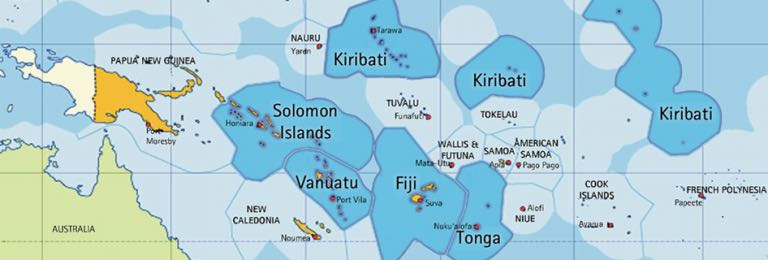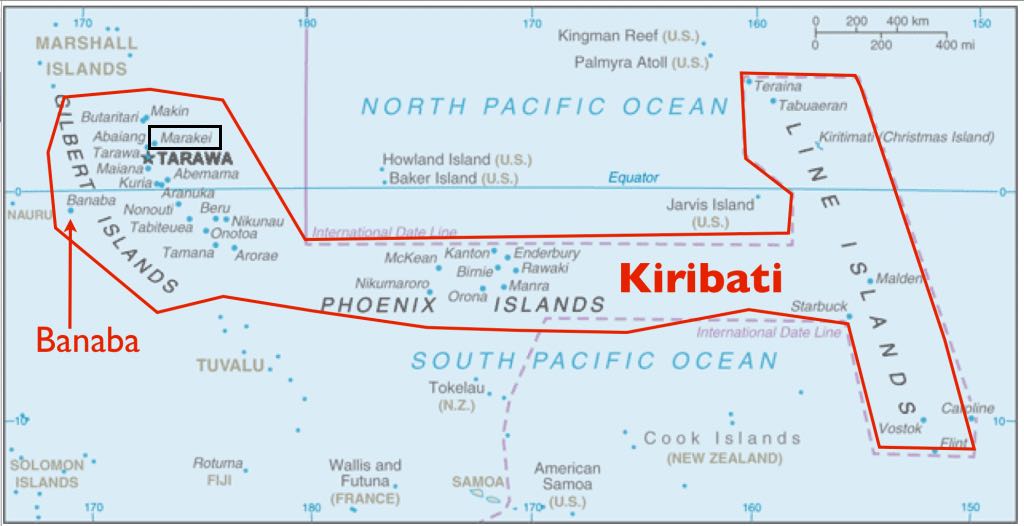
On 16th August, Michael Field, a veteran journalist focusing on South Pacific issues, posted on Facebook and Twitter that when Chinese ambassador Tang Songgen visited Kiribati, an independent country in the central Pacific Ocean, Kiribati locals used their customs to let him walking across locals’ backs as a welcome, and he claimed that they are children, even such custom has a long history but not normal to appear in the 21st century, and more notable in Tonga, he called Kiribati people for “stand up”.

Source: The Economics of Ecosystems & Biodiversity (TEEB)
The quality of the picture is quite low, obviously, Michael Field took the picture from somewhere or someone, he didn’t quote the source, and no one claimed the ownership. He has his own and fixed angles to judge things, so even he couldn’t be sure about the accuracy of all guessing details from the picture on that day, he confidently led the public to accuse the whole thing based on his predetermining judgments.

Source: Michael Field
The majority is used to believe the words from the specialist, so when Michael Field posted on social media implying that China applies hegemonic diplomacy and cultural appropriation on a weaker country to show privilege rights, the post surely went viral, many people on social media started a debate from cultural differences to political interests, which was encouraged by him at the beginning, but after short and angry comments based on what he said, soon more and more rational, open-minded or related people started to question him to mold public opinion without full acknowledgment and understanding of the event, then he turned off the commenting under his Facebook post until now.
Under the same post of his Facebook, many Kiribati locals felt surprised that he judged their custom so much and there were even many obvious mistakes inside his accusations. Kauae S. pointed out that males lying on the ground were “…not kids, they are about to reach their 30s…”. Using lines to match the heights of the locals and Tang Songgen is easy to clarify that Tang Songgen wasn’t walking across on the children’s backs.

Source: Michael Field’s Facebook
She also clarified that “the youths from Marakei”, Elizabeth A. also doubted the custom occurring notably in Tonga, said by Michael Field, was sure he had mistaken Kiribati’s culture with other similar but slightly different cultures.

Source: GeoCurrents
Indeed this old custom is hard to accept compared with other ordinary welcomes such as cheek-kissing or handshake, but if some people have to change it into a modern way, then for the locals it’s culture jamming, forcibly changing their cultures to match the dominant cultural trend. As Nuea A. questioned “…Must we all conform to the western ways just because it’s the ‘21st Century’?” To adopt the dominant culture or not is a very critical choice, and should be up to the locals’ choices, for others, to accept a different culture is an action to show respect for cultural diversity, which may bring uncomfortableness to them, but refusing may let the locals feel insulted and bring conflicts, a worse situation as Nuea A. explained.
Ruth C. Criticised that this post brings “…so much confusion about this practice which is traditional in Kiribati, particularly in the Northern areas. It’s a sign of respectful welcoming. Nowadays mostly used for brides but still done for highly respected dignitaries in some islands. The same was done for the Australian High Commissioner but no one seemed particularly outraged by that…”. From former Australian High Commissioner Philip Allars to former Prime Minister Julia Gillard, they both received the same manner of welcoming when visited Kiribati. But Australian Federal Liberal MP Dave Sharma only felt shocked when the same action happened to China.
Visitkiribati describes people, culture and heritage in Kiribati as “…has greatly been preserved by the isolation that comes with being at the heart of the Pacific Ocean. It is complex and diverse, with each island having its own unique ways. Many people remain true to the century-old traditions and practices that define what it means to be I-Kiribati”. I-Kiribati means the people of Kiribati.
As an experienced journalist, it’s common-sense to report news relying on facts more than personal opinions, to quote sources clearly, and to discussing doubts with the deeper investigation. As a specialist in Pacific Ocean counties, it’s basic to learn, understand, differentiate and to respect the local culture, but Michael Field did none of them in this post. He not only turned off the commenting but also stopped to give any further explanation of this post. In fact, Michael Field has an unpleasant history with Tonga and Kiribati over decades. Back in 1998, Tonga’s government routinely refused his entry due to his articles with strong personal opinion, which brings smear campaign to the country, but after he used international protests to give foreign pressures on this small and never colonized island country. In 1999, Kiribati also banned him as he published many articles to raise foreign attention in Kiribati’s government decisions. He created a storm far away from Tonga and Kiribati, pulling them into the chaos but staying the eye of the storm and watching worldwide critical pressure on every side he slightly mentioned, which is never a coincidence.
(Source: BBC / Twitter / Facebook / britannica / visitkiribati / Pacific Islands Report / ifex / Pacifix Islands News Association)



